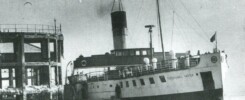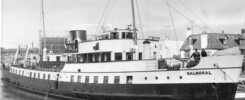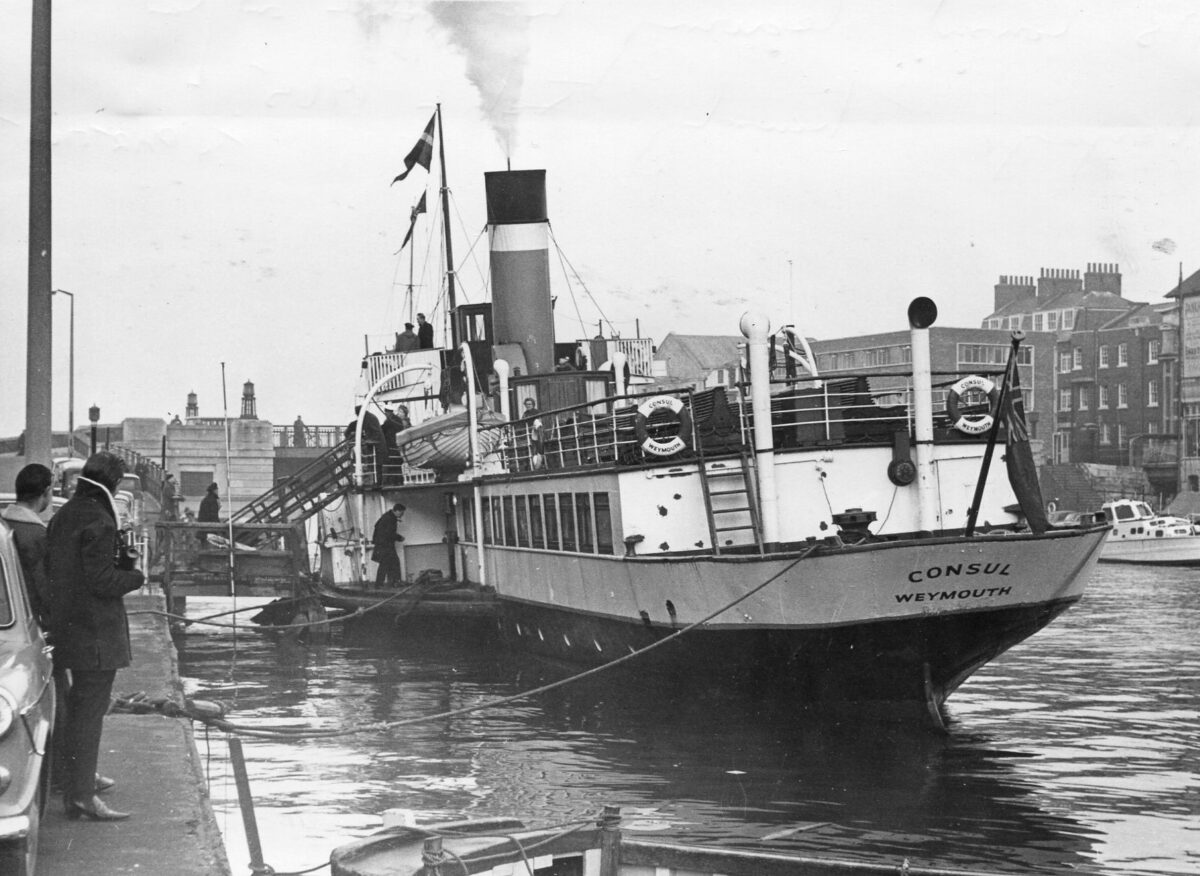
On Thursday 4th February 1965 Consul left Weymouth around 9.30am for her last voyage in steam across Lyme Bay to Dartmouth. In this picture you can see her master Captain Defrates, wearing his war time fawn duffel coat, on the port bridge wing next to her very tall previous owner Tony McGinnity. Down in the engine room was one of her previous Chief Engineers Bob Wills who had left Cosens in the 1950s to become landlord of the Swan Inn in Weymouth’s St Thomas Street and to run the former Cosens’s 50 passenger launch Topaz on one hour cruises round Portland Harbour from the Pleasure Pier.
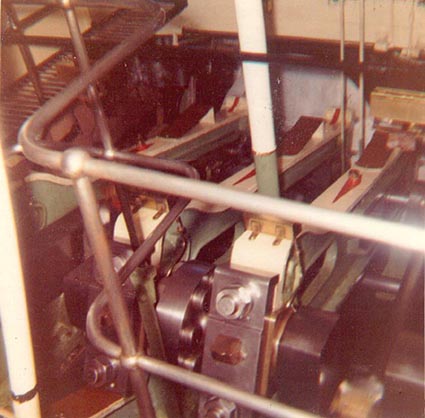
Bob had been a great help to Tony in the previous two summers which had not gone very well operationally or financially. Wrong way engine movements and getting the engine stuck so that Consul continually landed heavily alongside piers had been regular in 1963 in her season trying to run from Brighton, Eastbourne and Hastings. As a result Tony had ever been on the ‘phone to Bob to seek his advice.
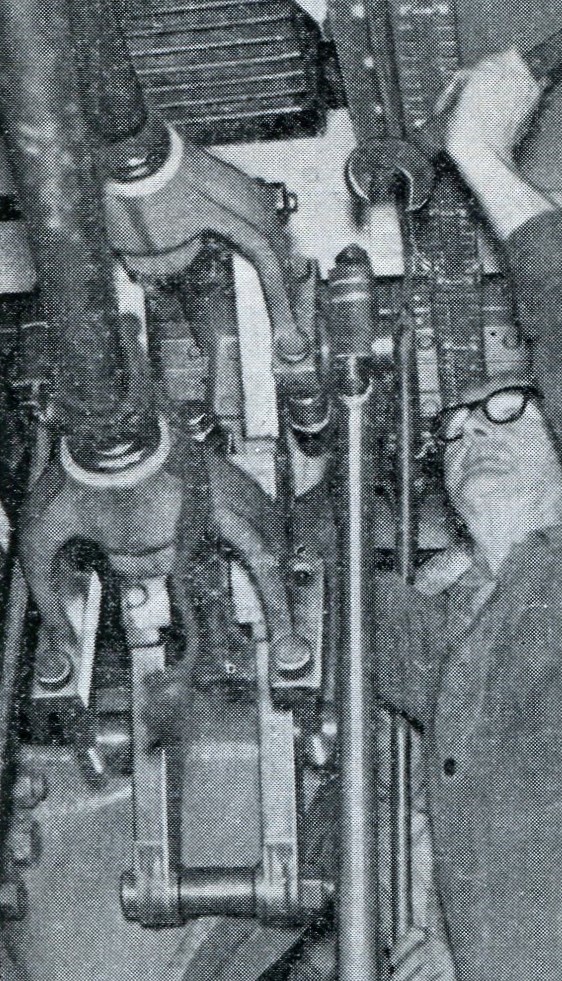
For 1964 Tony hired another former engineer Cyril Julien who had been chief of Cosens’s Victoria, Monarch and Consul. That solved the problem. There were no wrong way engine movements or getting the engine stuck in 1964.
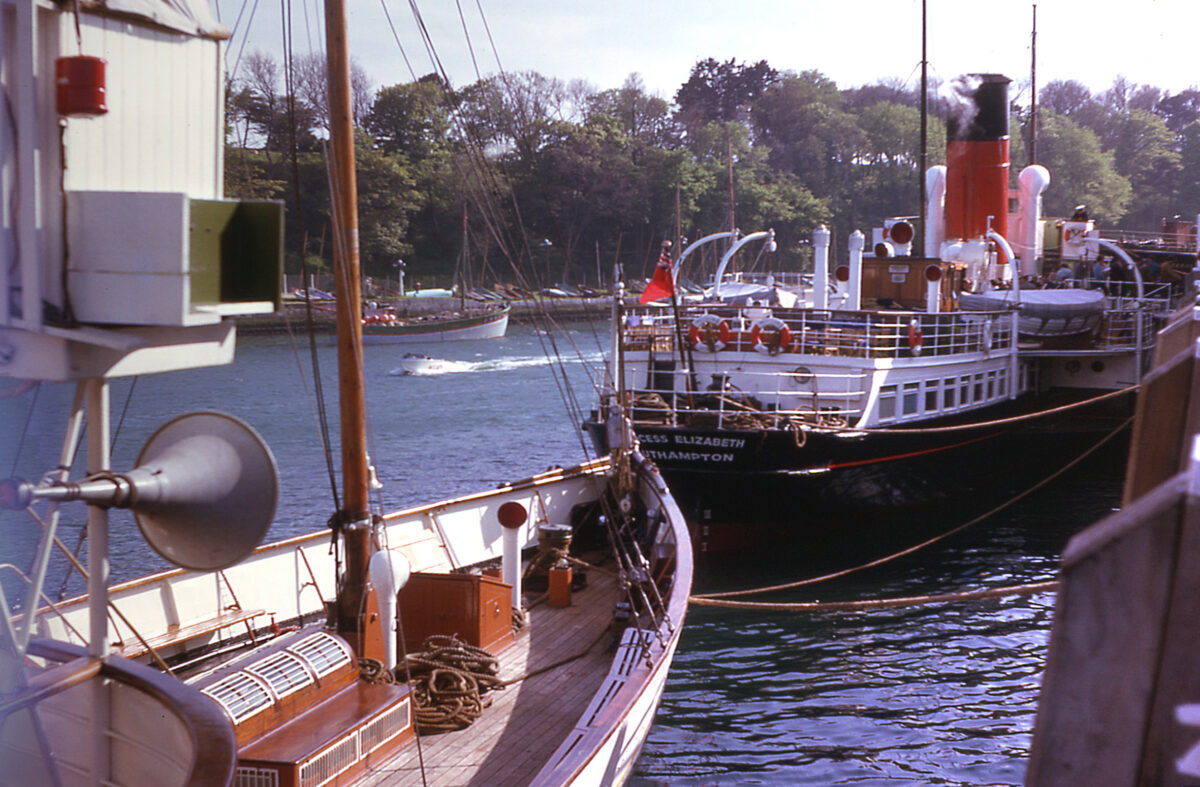
However the 1964 season was not good. With Consul’s Passenger Certificate restricted that season to little more than 200 she did not have the capacity to take in large chunks of cash when the going was good, And running a landing cruise to Lulworth Cove in the morning and then another one in the afternoon meant that the total for both could not exceed her limited passenger certificate if she was to bring them all back in the afternoon. As a result there were days when passengers were left behind and had to be returned to Weymouth by bus which added another additional and unwelcome expense to the operation as well as some complaints. It also did not help that Consul was running in competition with Princess Elizabeth which inevitably split a market already in steep decline. As the season wore on Tony could no longer afford to print more copies of his steamer notices for distribution so instead typed them up and ran them off on his own office Xerox machine. I still have some of these sad looking flyers in my collection here. Consul finished in late August, several weeks before Princess Elizabeth, and her owning company South Coast and Continental Steamer Ltd went into liquidation.
Wearing his new hat as a ship broker and surveyor, Tony McGinnity sourced a new, albeit static, role for the ship as the headquarters of a sailing school in Dartmouth. And so it was that on the morning of 4th February 1965 Consul was about to set off from Weymouth for her new career.
She was due away at 8am. My fourteen year old self went down to watch her go. The minutes ticked on. There was an issue which Bob was trying to fix with her engine. It got to 8.45am and so reluctantly I had to cycle off to school. It was not until about 9.30am that Consul eventually set off towed astern down the harbour by Brian Caddy’s 12 seater passenger boat which doubled up as Weymouth’s pilot cutter and occasional tug.
Captain Defrates told me later that he had asked mate Fred Miller to run off a course with due allowance for wind and tide across Lyme Bay to Dartmouth. Fred had been a mate with Cosens and mate of the Princess Elizabeth for the latter part of the 1964 season after mate Stanley Woods had walked out in a huff as he had not been allowed to use the engine for shifting ship from the lay by berth to the main position at the Pleasure Pier. I recall Captain Defrates introducing me to Fred on the bridge of the Lizzie in 1964 and Fred saying something along the lines of “I’ve had your mother in the back of my car many a time in Weymouth”. Captain Defrates smiled benignly and added “I think Fred means his taxi.”
The heading from the inner passage close in to Portland Bill to the Mewstone off Dartmouth is 255 degrees. High water at Weymouth that day was about 8.30am so for the first three hours of the trip Consul was punching the east going tide which would have knocked back her speed over the ground. For the rest of the voyage she had the west going tide with her but in each case the set is slightly outwards towards the sea. This is more pronounced near Portland Bill and becomes worse the closer you get to the Devon coast where the direction of the current moves from westerly to south westerly and then to almost southerly setting vessels on a direct heading from Portland Bill to Dartmouth straight out to sea. Fred’s course that day across Lyme Bay taking account of these factors turned out to be rather less than spot on. Maybe he was expecting her to be going faster than turned out to be the case and that would have made a difference. When Dartmouth failed to show up as expected after the distance had been run Captain Defrates turned Consul onto a more north westerly heading and in due course land was sighted and eventually the Day Beacon marking the entrance to the river Dart.
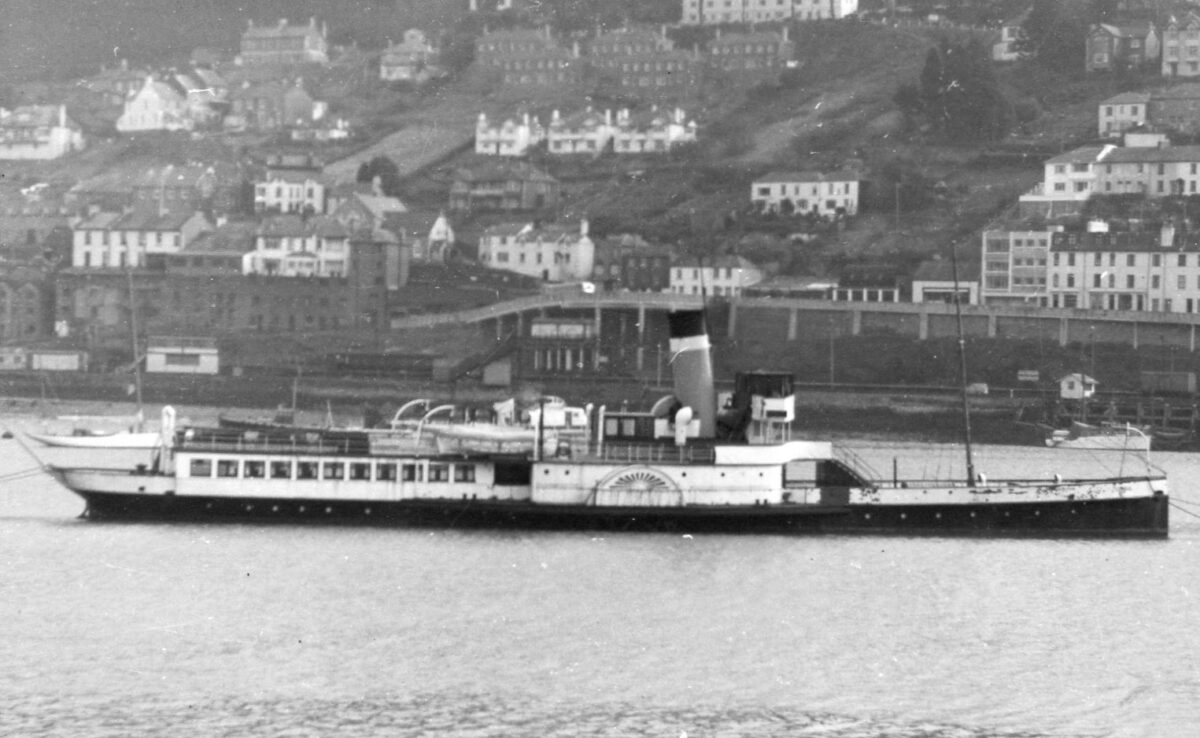
Consul sailed into Dartmouth around 5pm with the flood tide under her and steamed up to turn in the slightly wider section of the river near Philip’s Shipyard where Captain Defrates had regularly turned the Princess Elizabeth when he had been her master in 1961. Consul then proceeded down river to moor head out on the buoys off Kingswear with the assistance from a work boat. Her last “Finished with Engines” was rung shortly after 5.30pm.
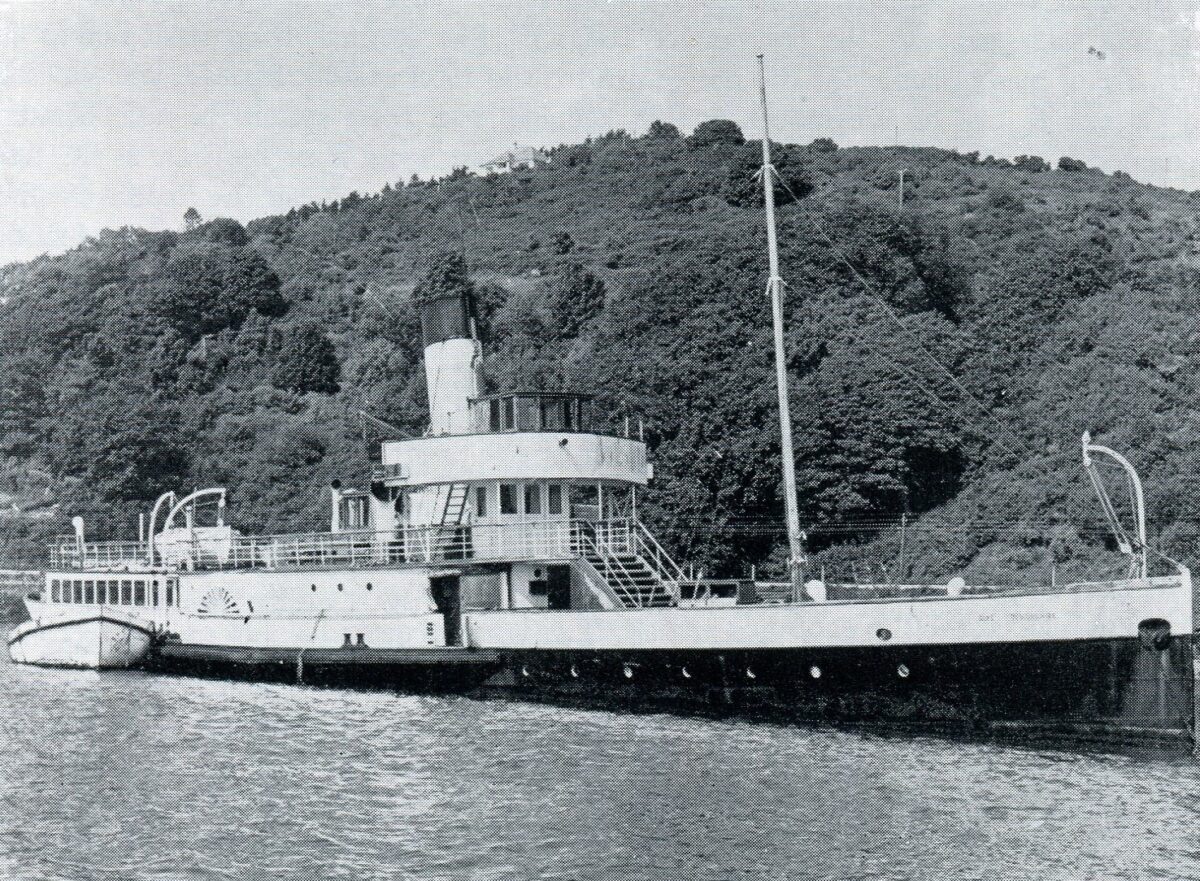
In due course Consul was moved a little further up river to moorings on the Kingswear side just below the Higher Ferry where she was fitted out for her new role as a sailing school. Although it was never intended that she should move about in this new guise, the Dart Harbour Commission did require her to be able to shift ship under her own power. This was unrealistic for a steam ship without the necessary competent and therefore expensive crew in attendance and keeping up the boiler certificate and survey regime so in the end this is one of the issues which caught up with her and forced her eventual sale.
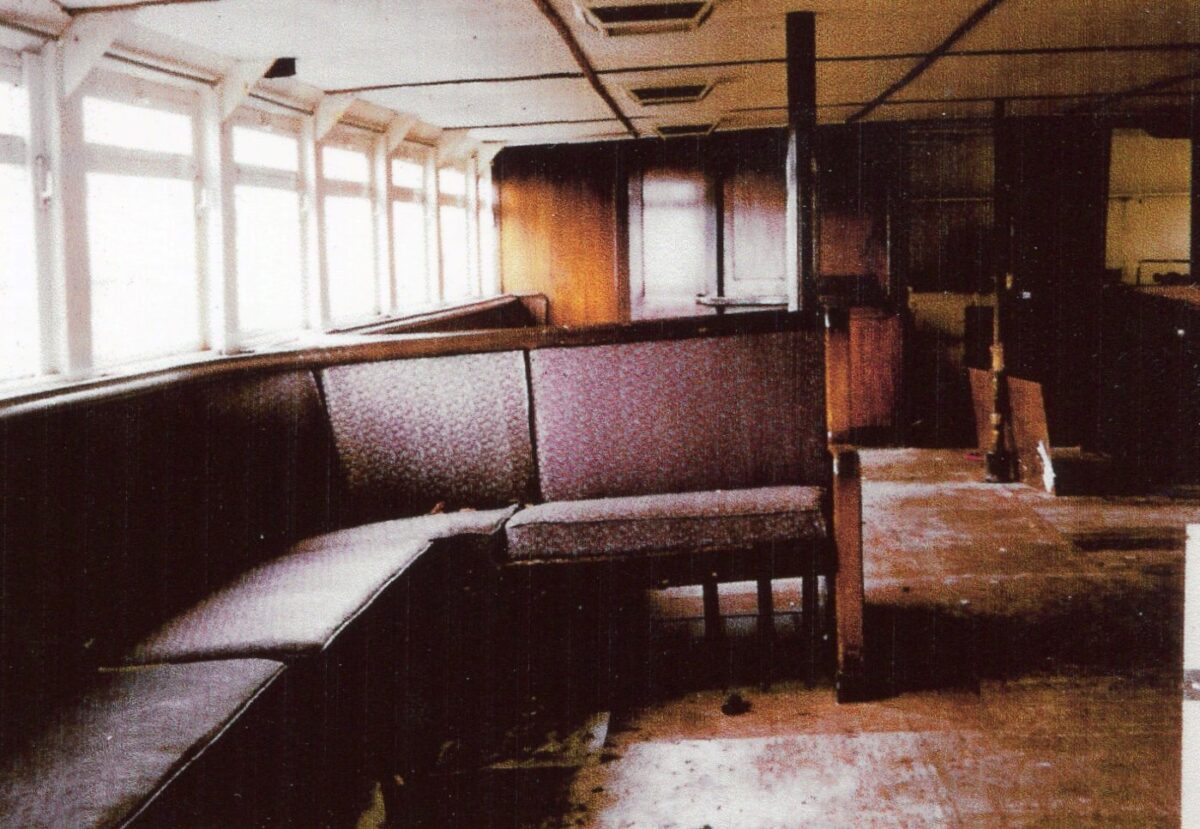
In any case Consul was not in fine fettle by then. As all who have any experience of dealing with traditional wooden decks traditionally caulked will know, keeping them watertight is ever an issue. And people paying good money for their sailing holiday were not best pleased to find that when they wanted to turn in they were rained on by leaks in the deck-head above them.
One of my engineers on KC at Chatham in the late 1980s had booked a sailing holiday on Consul, now trading under her original name of Duke of Devonshire, in her short stay at Dartmouth. He recalled that the accommodation was very basic and that the new owner had mocked him for turning up wearing a suit and tie. Well whatever views anyone may take about that, mocking one of your valued paying customers doesn’t come across to me as in the top league of welcoming customer service. But there we are.
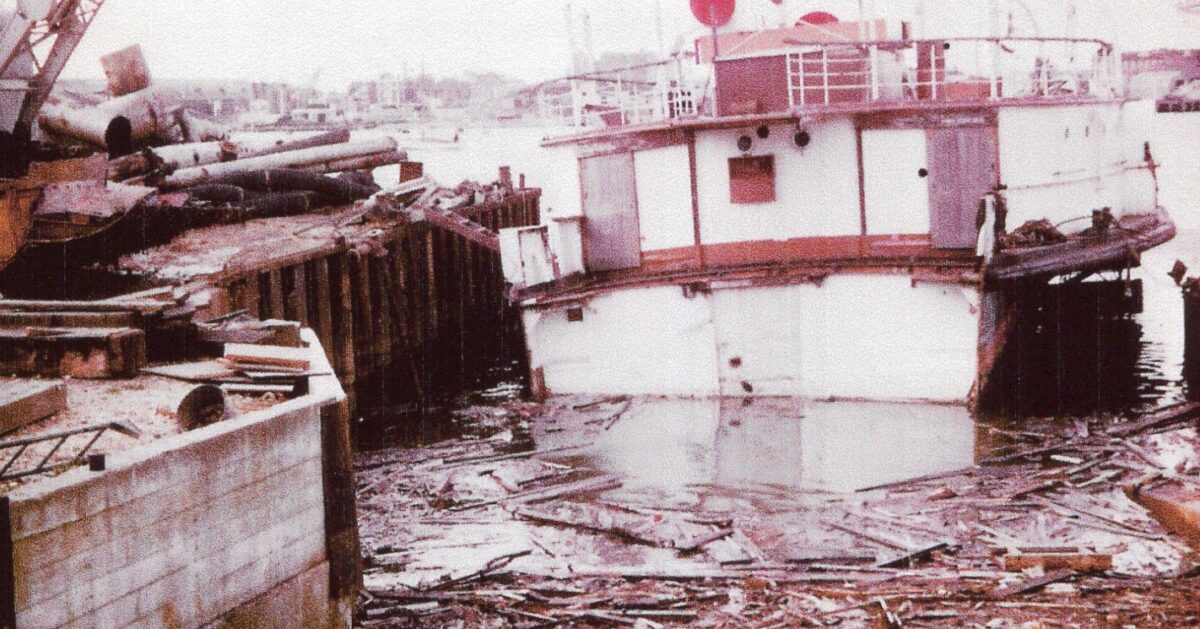
Consul as Duke of Devonshire had only three seasons in this new capacity before the business failed. She was towed to the scrapyard in Southampton in October 1968.
Kingswear Castle returned to service in 2023 after the first part of a major rebuild which is designed to set her up for the next 25 years running on the River Dart. The Paddle Steamer Kingswear Castle Trust is now fund raising for the second phase of the rebuild. You can read more about the rebuilds and how you can help if you can here.
John Megoran
This article was first published on 4th February 2021.

